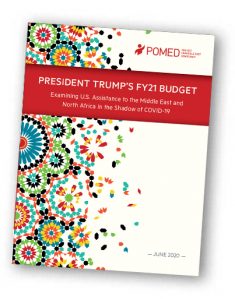Watch the video of the virtual launch event for this report here.
President Donald Trump’s fourth international affairs budget looks much like the prior three iterations. His Fiscal Year (FY) 2021 request proposes crippling cuts to the foreign assistance budget funded by the State and Foreign Operations appropriations bill. The Trump administration’s top-line request of $44.1 billion, while 2.9 percent higher than the FY20 request, would nevertheless constitute a 22.2 percent cut as compared to what Congress appropriated ($56.6 billion) in the FY20 Further Consolidated Appropriations Act. This is an even deeper reduction than the 21.3 percent that the Trump administration proposed last year. Likewise, President Trump is again proposing a substantial reduction in democracy and governance funding, a cut of 30.3 percent as compared to what the administration spent in FY19.
As the president’s foreign affairs budget resembles his last three submissions, so, too, the congressional reaction is likely to mirror past years. Congress is once again primed to reject the administration’s proposed cuts on a bipartisan and bicameral basis.
If the interplay between the Trump administration and Congress is likely to play out as in past years, what makes the FY21 budgetary process different is the backdrop of the coronavirus pandemic. While much remains unknown at this point in time, it appears likely that the crisis will both increase the demand for international aid and, simultaneously, make the provision of such assistance more difficult. To be sure, any administration would have been overwhelmed by COVID-19, but President Trump’s visceral aversion to U.S. aid appears even more out of step with the scale of the challenges the United States faces than it was before.
This report analyzes President Trump’s FY21 foreign aid budget request for the Middle East and North Africa, comparing it to past requests and congressional appropriations and examining how Congress is likely to respond. While this report places special emphasis on democracy and governance aid, it also covers security, economic, and humanitarian assistance.
.
Key Findings for the Middle East and North Africa (MENA):
.
- While Trump’s FY21 request continues to propose more U.S. foreign aid—$6.5 billion—for MENA than for any other region, he does not request a significant increase in funding for the Middle East—as he does for several other regions. The president bolstered his requests for East Asia, Europe, and the Western Hemisphere by double digits (in percentage terms), but he actually requested a small decrease for MENA as compared to last year’s budget proposal..
. - The president’s budget request continues the trend of securitizing U.S. aid to MENA, while giving short shrift to democracy and governance programming. The Trump administration’s $5.46 billion proposal for security assistance accounts for 83.4 percent of the total request for MENA, while democracy assistance represents a mere 2.9 percent.
. - Consistent with the Trump administration’s relative lack of interest in promoting democracy and human rights abroad, the FY21 request seeks virtually the same amount of aid for Egypt as last year, despite the government’s continued abuses and its role in the death of a wrongfully imprisoned American. The $1.38 billion request includes the same $1.3 billion in Foreign Military Financing (FMF) funding that Egypt has received since 1987.
. - President Trump continues the pattern of seeking severe cuts in aid to Tunisia, the lone democracy to emerge from the 2011 Arab uprisings. While the $83.8 million requested for Tunisia in FY21 is only $2.6 million less than last year’s request, it would represent a glaring cut of 65.3 percent as compared to the FY20 level appropriated by Congress.
.
- The FY21 request proposes zeroing out bilateral funding for the West Bank and Gaza, as part of the administration’s effort to coerce the Palestinians to negotiate with Israel on the basis of Trump’s “peace plan.” The proposed $35 million in bilateral assistance for the West Bank and Gaza requested in FY20—all International Narcotics Control and Law Enforcement (INCLE) funding—has been moved into a “Diplomatic Progress Fund” that the administration would administer with minimal oversight from Congress.
. - President Trump once again proposes slashing U.S. assistance to conflict countries, including Iraq and Syria, reflecting his belief that other countries should increase their share of the burden for reconstruction and development. The FY21 request includes no bilateral aid to Syria for the second consecutive year, and seeks to cut funding for Iraq by 72.4 percent as compared to the FY20 appropriated level.
.
Read the full report here.
Navigate to a country section:






